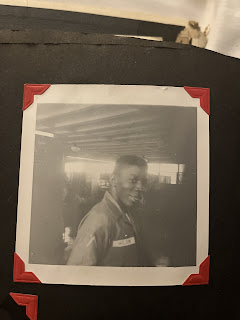Worth
This morning as I got ready to serve capitalism in order that I might have a roof over my head, I listened to the 1619 Project podcast. One episode behind the recently released one, I listened to “The Birth of American Music,” which detailed how music in America originated, from slave songs to the rise and immense popularity of minstrelsy, through to Motown and the blues on down to yacht rock. What most interested me, not to be confused with surprise, was that the very era of music covered in the podcast co-opted African-American tradition in some aspect other another. While this wasn’t my first time hearing this history of American music, for some reason the idea of respectability came to mind while Motown was being discussed.
 |
| Taken on my phone while listening |
The era of Motown and the inimitable Berry Gordy came about in the 1960s as a direct result of African-Americans wanting to take back our music, to take back our historic sound, phraseology, cadence and tone, to show this country, and the world, that we were good enough, that we should be recognized as polished, that Black culture could be “hi-brow.” This came after decades of being modeled in the public eye after clowns or fools in minstrelsy which led to the appeasement of majority white audiences, so they wouldn’t feel so bad about the atrocities of slavery going on around them. ‘See, it isn’t so bad, the white men covered in blackened pig grease in attempt to portray Black men on stage are actually happy with their lot. See the big smiles on their faces?’ (Yes, our lips may be big but I mean really?) Even after slavery “ended” and Black performers were able to get on stage themselves, they too participated in Black face because that was what crowds wanted to see.
 |
| Photo courtesy of Wikipedia |
Respectability politics in essence, come up in almost every aspect of Black life. Not only is it important in looking at who was “polished” or “good enough,” it became increasingly important, specifically as it relates to victimhood and who is “worth” championing or saving. The idea that a woman or a girl, a man or a boy, has to prove themselves first to their community, then to the larger public, before receiving the support they’re due, AFTER having gone through their own arduous ordeal, is absurd. Why put the onus on the victim or the abused, when the abuser has so much more to answer for? Why would it matter what she wore when he decided it was acceptable to attack her? Why would it matter that she’s trans when that has absolutely no effect on your life or wellbeing, or anyone else’s, whatsoever? Why would it matter where you were when not every inch of the world is able to escape being “unsavory”? Why is it necessary to consider what his/her/their hair looks like if they are more than capable of performing their duties in their assigned role, whatever that may be?
This list could go on and on but the moral of the story is, it shouldn’t. It's such a wonderful work Nikole Hannah-Jones is doing, presenting this body of work to the public on one of the most popular news bastions this country has ever seen. None of these things should matter when a person, a people, a human, a soul, is being considered. Dismantling the mental structures and societal archetypes we’ve been taught in order to see all others as “worthy” of listening to and believing takes work but you have to be willing to do it. As was mentioned in the podcast, you can feel it in the music, you have to believe that the struggle is worth it. The necessary pain we experience can beget an irresistible joy.
xx
xx
 |
| Etta James, singing her heart out Photo courtesy of Soundcloud |

Comments
Post a Comment